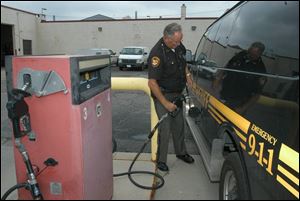
Fuel costs burn holes in government budgets
9/2/2005
Deputy David Lindhorst refuels at the Lucas County garage. Many area governments are trying to address rising gas prices.
While consumers across the country have been bruised by burgeoning gas prices, local governments are likewise lamenting the budget pains caused by rising fuel costs.
Recently revised estimates by the city of Toledo have put fuel costs at "a minimum" of $600,000 above the initial budget of $1.88 million. Estimated costs are now at $2.48 million - an increase of around 32 percent.
"There are absolutely going to be some supply problems," said Tom Crothers, the city's chief of staff and finance director.
Mayor Jack Ford yesterday called for citizens to conserve fuel and said the city would immediately implement its own steps to hold down city fuel costs. The plan includes a ban on idling all non-diesel city vehicles when no driver or passenger is in the car, and an analysis of city vehicles with the goal of reducing the city's fleet by 10 percent by the end of the year.
Departments that let their employees take vehicles home must submit a schedule explaining the need to take each of them home. In addition, the city will take measures to prevent fuel theft by city employees, including adding electric monitors to several city fueling stations, and tracking fuel cans.
Based on current costs, city officials are predicting $2.8 million in fuel costs for 2006. They hope to lower that figure to $2.5 million.
Mayor Ford urged citizens to use public transportation - but the transit authority may not have the capacity to increase its service to accommodate new passengers.
This year, TARTA budgeted $1.25 per gallon for diesel, while in July, it paid an average of $1.77 per gallon.
TARTA's latest fuel order, placed Wednesday, cost $1.98 per gallon.
Even if prices revert to July levels, TARTA is going to be hundreds of thousands of dollars over budget on fuel this year.
General Manager James Gee said the budgetary impact remains to be evaluated. For now, TARTA has no plan to cut service or raise fares - but neither does the agency have the capacity to increase service for new riders who may be coming aboard.
At the county level, Kevin Helminski, a budget analyst with Lucas County's Office of Management and Budget, said the sheriff's office expended $92,000 of its supply budget through the end of July - compared with $70,000 last year.
"That was before the most recent jump in prices," pointed out Mike Beazley, county administrator.
The sheriff's office's total budget for the year is $129,000.
Tina Skeldon Wozniak, president of the board of Lucas County commissioners, said the commissioners themselves have not been formally approached by any department concerning gas price concerns, but she expects that as the prices increase, "informal discussions will become formal ones."
Other cities are being affected as well. In Rossford, the city police department reached its $16,500 gasoline budget last month - four months ahead of schedule, Finance Director Laurie Sabin said.
She said the police department will have to cut back in other areas, like training and new purchases.
"They're going to have to live with their budget for the rest of the year," Ms. Sabin said.
August fuel costs in Genoa have gone up 29 percent compared to last year, said Fiscal Officer Chuck Brinkman - even though the police department has one less officer patrolling this year.
Officers in Lake Township are using the motorcycle and bicycle patrol as much as possible and are patrolling in the police cars in pairs to prevent a loss in the amount of manpower on patrol, said Police Chief Mark Hummer.
And in Fulton County, higher fuel costs have forced officials to tap into funds set aside for unanticipated emergencies, said Vond Hall, county administrator.
The county recently placed an order for fuel at $2.40 per gallon - one of the costliest prices yet, he said.
And some county employees are now grumbling, given a roll-back on mileage reimbursements from 40.5 cents per mile to 30 cents earlier this year because of county budget constraints.
Sandy Griggs, director of the Fulton County Senior Center, said if fuel prices remain over the top, she can't promise that services will stay at the current level, and added that some volunteers might not be able to continue delivering meals.
In the village of Archbold, Dennis Howell, village administrator, said the fuel costs "obviously have a negative affect" on the village's budget. Employees are being reminded to drive only when necessary.
"We want them to do their jobs, but we also do not want them to take unnecessary trips," he said, adding that has always been the village's policy.
Blade staff writers Erika Ray, David Patch, and Janet Romaker contributed to this report.